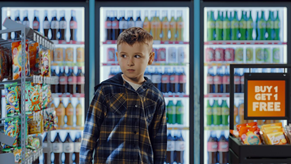Salmonella
Beef, poultry, eggs and raw milk all can carry Salmonella bacteria.
Salmonellas are a group of bacteria that can cause food poisoning. They live in the gut of many animals. The animals become infected with the bacteria by direct contact with other animals, feed or water, or through grass, wild birds and rats.
How can I be exposed to Salmonella infection?
Eating food that contains live Salmonella can cause food poisoning. The foods with the highest risks of Salmonella are:
- Beef
- Poultry, like chicken, turkey, duck and goose
- Eggs and egg products
- Raw milk
Poor kitchen hygiene can also be the cause. Salmonella can be spread from raw to cooked food by hands, kitchen surfaces and equipment.
The risk of having Salmonella on food in your home is very low due to very good control systems on the island of Ireland, but follow the advice below to ensure your food is safe to eat.
How to avoid getting a Salmonella infection
Proper cooking will kill Salmonella, so follow our guide to make sure your meat is properly cooked.
Good kitchen hygiene will help protect you from cross-contamination. So always wash your hands straight away after handling raw meat and poultry, and before you touch any kitchen surfaces and utensils.
Avoid cross-contaminating your kitchen surfaces and utensils by throwing away packaging from raw meat and poultry as soon as you remove it. Wash any utensil that has come into contact with raw meat, eggs or any meat packaging.
Always store raw meat and poultry at the bottom of the fridge so that it doesn’t touch any ready-to-eat foods, or the juices don’t drip on them.
Never wash raw poultry, as splashes from the sink can spread the bacteria around your kitchen.
Take care with eggs, especially lightly cooked eggs, or foods that are made with raw egg. We recommend that vulnerable groups such as young children, pregnant women and older people do not eat these.
How do I know if I have a Salmonella infection?
Typically, a person becomes ill between 12 and 36 hours after eating the food. The usual symptoms are:
- Diarrhoea
- Cramps
- Vomiting
- Fever
The illness is sometimes severe and admission to hospital may be necessary. The people most at risk from life-threatening illness are the very young, the elderly and people with an already weakened immune system.
How can Salmonella food poisoning be treated?
Salmonella infections usually resolve in four to seven days without requiring treatment, unless the patient becomes severely dehydrated or the infection spreads from the intestines.
If you have these symptoms, you should visit your doctor. They will ask about the foods you have eaten. They may also ask for a stool sample to find out which bacteria has caused the infection.
Your doctor will monitor you and, if you are very ill, may admit you to hospital. It is important to drink plenty of water so you do not become dehydrated.




